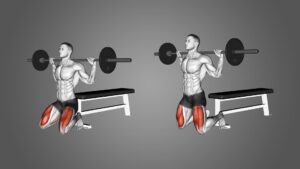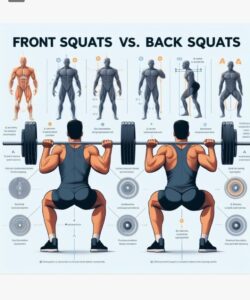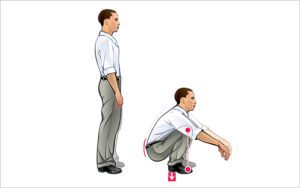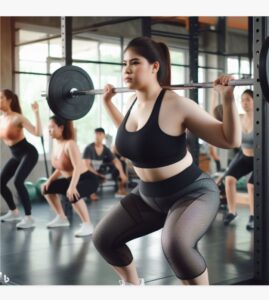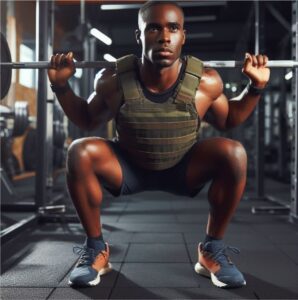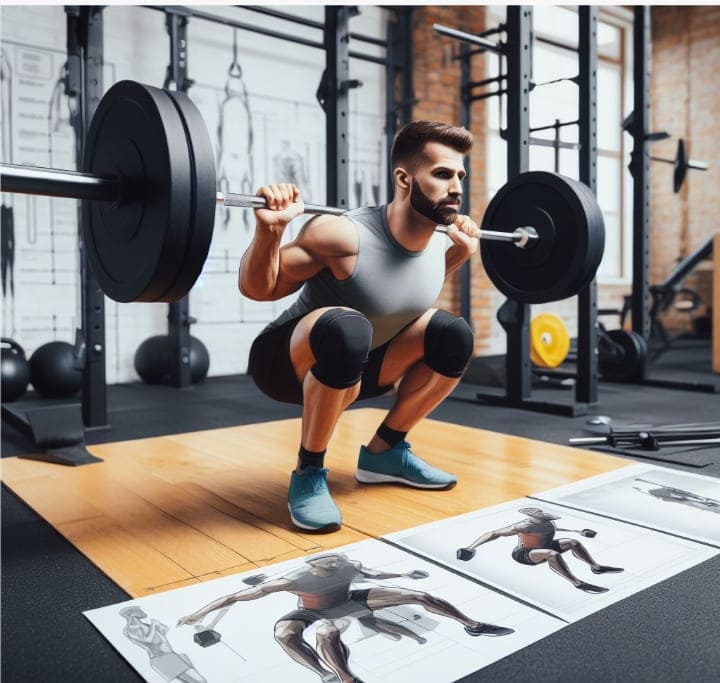
In the realm of strength training, few exercises hold as much reverence as the heavy squat. For decades, this fundamental movement has served as a cornerstone for athletes and fitness enthusiasts alike, building muscle, enhancing strength, and unleashing explosive power. Far from being a mere leg exercise, heavy squats offer a myriad of benefits that extend far beyond the muscular system.
In this article, we will explore 10 benefits of heavy squats and how they provide these benefits. The amazing benefits of doing heavy squats are;
1. Enhanced Muscle Growth and Development:
Heavy squats are synonymous with muscle activation. They effectively stimulate muscle growth and development throughout the lower body, targeting the quadriceps, hamstrings, glutes, and calves. The depth and intensity of the squat position engage these muscle groups profoundly. With each rep, these muscles work cohesively to lift the heavy load, resulting in micro-tears within the muscle fibers, which, during recovery, lead to muscle growth and development.
This squats variation play a pivotal role in achieving muscle hypertrophy, which refers to the increase in the size of muscle cells. The tension and stress placed on the lower body muscles during heavy squats, combined with progressive overload, trigger adaptations in muscle fibers. This leads to an increase in muscle size, ultimately sculpting a defined lower body.
2. Improved Strength and Power:

Heavy squats are not just about muscle size; they significantly increase strength and power in the lower body. This concept is rooted in the strength-power continuum, which delineates the relationship between maximal strength and explosive power. Maximal strength is the capacity to lift heavy loads, while explosive power is the ability to generate force quickly. Heavy squats contribute to both ends of this continuum, making them an invaluable exercise for athletes and fitness enthusiasts alike.
The enhanced strength and power acquired from heavy squats translate into improved athletic performance. Whether you’re a sprinter exploding off the starting line or a basketball player leaping for a dunk, the gains from heavy squats directly benefit these dynamic movements. Strength enables you to overcome resistance, while power allows you to accelerate rapidly. Therefore, incorporating heavy squats into your training routine can give you the edge in various sports and activities.
3. Enhanced Hormonal Response:
Heavy squats are not just a physical feat; they also trigger a significant hormonal response. When lifting heavy loads, the body releases hormones such as testosterone and growth hormone. These hormones play a pivotal role in muscle growth, fat loss, and anabolic processes.
Testosterone and Muscle Growth: Testosterone, often dubbed the male hormone, plays a crucial role in muscle growth. Heavy squats, particularly compound movements, elevate testosterone levels. This hormone promotes protein synthesis, the process through which the body builds and repairs muscle tissue. The result is increased muscle mass and strength.
Growth Hormone and Fat Loss: Heavy squats also elevate growth hormone levels. Growth hormone is an anabolic hormone that stimulates tissue growth and repair. It aids in fat metabolism and plays a significant role in energy utilization. This hormone promotes the breakdown of fats, thereby aiding in fat loss and body composition improvement.
Anabolic Processes: Anabolic processes involve building molecules and structures in the body. Heavy squats, through their hormonal response, support these processes. Increased testosterone and growth hormone levels foster an environment where the body is primed for muscle growth and fat loss. This, in turn, contributes to an improved physique and physical performance.
4. Improved Core Stability and Engagement:
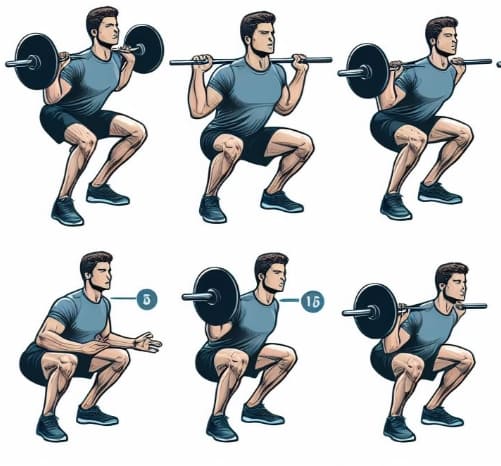
Heavy squats, like many compound exercises, engage a multitude of muscle groups, including the core muscles. The core, composed of the abdominal muscles, back muscles, and obliques, plays a crucial role in maintaining stability, balance, and proper posture during the squat.
As you lower your body during a squat, your core muscles work synergistically to stabilize your spine and pelvis, preventing excessive movement and ensuring proper alignment. This engagement of the core muscles is essential for preventing injuries, particularly in the lower back, which is vulnerable to strain when the core is weak or inactive.
The benefits of a strong core extend beyond injury prevention. A well-developed core enhances posture and balance, allowing for more efficient movement patterns and better performance in various activities. This is particularly important for athletes who rely on core strength for explosive movements, agility, and stability.
5. Increased Bone Density and Strength:
Regular heavy squats can contribute to increased bone density and strength, reducing the risk of osteoporosis, a condition characterized by weakened bones that are more prone to fractures.
When you perform heavy squats, you place a mechanical load on your bones. This mechanical stress stimulates bone remodeling, a process in which old bone tissue is replaced with new, stronger bone tissue. Over time, this increased bone density reduces the risk of fractures and enhances overall bone health.
The benefits of strong bones extend beyond preventing osteoporosis. Strong bones provide a solid foundation for movement, allowing you to engage in weight-bearing activities without undue risk of injury. They also play a role in maintaining overall health, supporting your organs and providing structural support for your body.
6. Improved Cardiovascular Health:
Heavy squats, despite being a strength training exercise, can also contribute to improved cardiovascular health. The mechanical stress of heavy squats increases blood flow, forcing your heart to work harder to pump blood throughout your body. This peningkatan in blood flow enhances the delivery of oxygen and nutrients to your muscles, supporting their growth and repair.
Additionally, regular heavy squats can improve your heart’s ability to pump blood effectively. As your heart adapts to the demands of the exercise, it becomes more efficient at circulating blood, which can lower your resting heart rate and improve your overall cardiovascular fitness.
The benefits of heavy squats on cardiovascular health extend beyond improved heart function. Regular heavy squats can help reduce the risk of cardiovascular diseases, such as heart attack and stroke. By improving blood flow and reducing stress on the heart, heavy squats can contribute to a healthier cardiovascular system.
7. Enhanced Metabolic Rate and Calorie Burn:
Heavy squats, like other strength training exercises, can contribute to an enhanced metabolic rate, leading to increased calorie burn even at rest. This metabolic boost can be attributed to several factors:
- Increased muscle mass: Muscle tissue, compared to fat tissue, burns more calories at rest. When you build muscle through heavy squats, you increase your resting metabolic rate, allowing you to burn more calories even when you’re not actively exercising.
- Excess post-exercise oxygen consumption (EPOC): After you perform heavy squats, your body continues to burn calories for an extended period, even after you’ve finished the workout. This phenomenon, known as EPOC, is primarily driven by the repair and rebuilding processes that occur in your muscles following exercise.
- Improved insulin sensitivity: Heavy squats can help improve your body’s sensitivity to insulin, a hormone that regulates blood sugar levels. When you’re more insulin-sensitive, your body can more effectively utilize glucose for energy, leading to reduced fat storage and improved overall metabolic health.
The combination of increased muscle mass, EPOC, and improved insulin sensitivity can significantly enhance your calorie burn, contributing to weight management and overall fitness goals. Heavy squats, when incorporated into a balanced diet and regular exercise routine, can be a powerful tool for achieving weight loss or maintaining a healthy weight.

8. Improved Mental Toughness and Discipline:
Heavy squats are not just a physical challenge; they also demand mental toughness and discipline. The very act of performing a heavy squat requires focus, controlled breathing, and consistent effort.
As you lower your body with a loaded barbell, your mind must engage to maintain proper form, control your breathing, and push through any mental barriers that may arise. This mental engagement, over time, can translate into improved mental toughness and discipline that extends beyond the gym.
The benefits of heavy squats on mental health extend beyond improved mental toughness. The sense of accomplishment that comes from successfully completing a heavy squat can boost self-confidence and self-esteem. Additionally, the release of endorphins, the body’s natural feel-good chemicals, during heavy squats can contribute to improved mood and reduced stress levels.
Incorporating heavy squats into a regular fitness routine can nurture a mindset of resilience, perseverance, and self-belief, qualities that are essential for success in any aspect of life. The mental fortitude gained from heavy squats can empower individuals to tackle challenges, overcome obstacles, and pursue their goals with greater determination.
9. Reduced Risk of Injury:
Engaging in heavy squats can effectively contribute to reducing the risk of injury. By strengthening muscles, particularly in the lower body, heavy squats aid in fortifying the supporting structures around the hips, knees, and ankles.
The muscular engagement and load-bearing nature of the exercise create a robust musculoskeletal foundation, which is vital for injury prevention. Strengthening the quadriceps, hamstrings, glutes, and calves improves overall lower body stability and resilience, reducing the vulnerability of these joints to potential injuries.
Heavy squats demand core engagement and balance, essential for stabilizing the body during the exercise. Over time, these squats help optimize movement patterns, ensuring proper biomechanics and alignment. This improvement in movement patterns reduces the likelihood of compensatory movements that can lead to strain or injury in other areas.
Enhanced balance, combined with improved movement control, translates into more efficient and safer movement execution during various activities.
Injury prevention is paramount for maintaining an active lifestyle. Injuries can derail fitness routines and lead to long-term issues, hindering an individual’s ability to engage in physical activities.
Preventing injuries through exercises like heavy squats not only safeguards the body but also allows individuals to sustain their fitness regimen and partake in sports and daily activities without the setbacks of potential injuries.
10. Enhanced Athletic Performance:
Heavy squats significantly enhance athletic performance by increasing strength, power, and explosiveness. The strength gained through these squats aids in overcoming resistance and is crucial for activities that require forceful movements. The power and explosiveness developed from heavy squats enable individuals to generate force rapidly, facilitating swift and powerful movements, such as jumping, sprinting, or quickly changing directions.
Incorporating heavy squats into training programs can benefit a wide array of sports. Athletes from disciplines such as track and field, basketball, football, and weightlifting can particularly gain from heavy squat training. Track and field athletes benefit from explosive power and improved stride length, while basketball and football players can harness the increased lower body strength for jumps and sprints.
Additionally, weightlifters can enhance their performance in their respective disciplines through improved leg strength and explosiveness, essential for lifts like the clean and jerk or snatch.
By improving strength, power, and explosiveness, heavy squats have a transformative effect on athletic performance, benefiting individuals across various sports and physical activities. Moreover, their role in injury prevention is vital for maintaining a consistent and active lifestyle, ensuring individuals can partake in activities without the fear of potential injuries derailing their fitness pursuits.
As we conclude our exploration of the 10 amazing benefits of heavy squats, it becomes evident that this exercise is not merely a leg workout; it is a transformative tool for achieving exceptional fitness and athletic performance. From sculpting a defined lower body to enhancing strength, power, and hormonal balance, heavy squats have the potential to revolutionize your fitness journey.
To reap the full benefits of heavy squats, it is crucial to prioritize proper form, gradual progression, and adequate rest and recovery. Consulting with a qualified trainer can ensure that you are performing the exercise safely and effectively, maximizing its impact while minimizing the risk of injury.
As you embark on your heavy squat journey, remember that consistency is key. Regular heavy squats will gradually unlock the full potential of this exercise, propelling you towards strength, power, and athletic excellence.
Related Posts
Reference:
[1] https://barbend.com/benefits-of-squats/
[2] https://crossfitlincoln.com/5-benefits-of-heavy-back-squats/
[3] https://www.healthline.com/health/exercise-fitness/squats-benefits
[4]https://kustomkitgymequipment.com/blogs/news/benefits-of-heavy-squats/
[5] https://www.medicalnewstoday.com/articles/benefits-of-squats
[6] https://squatuniversity.com/2016/05/20/why-you-should-squat-heavy/



